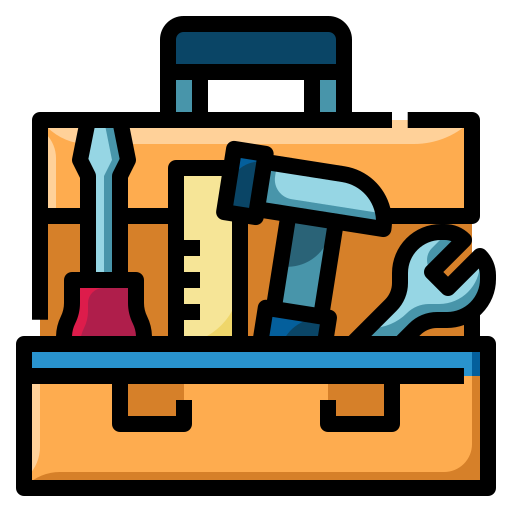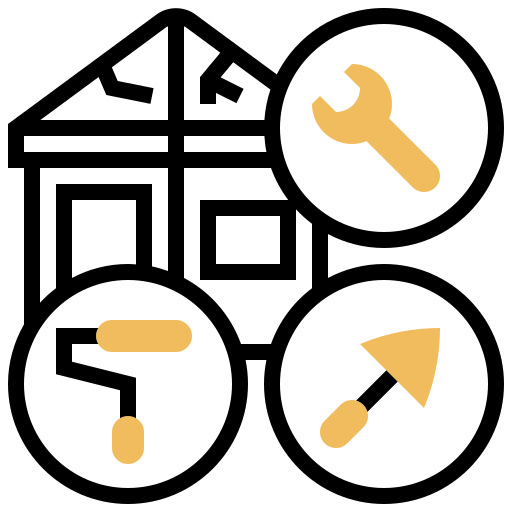Tools Everyone Should Own
Whether you are a homeowner, or a renter there is something empowering about having your own tools and being able to fix repair you're own things. It means you don't have to call a handyman, friend, or maintenance to tighten a cabinet, or install a light fixture.

Hammer
A hammer is the hardest working tool you’ll ever own. And it should be at the top of your list of tools everyone needs. You can use it to hit nails, of course, but you can also use a hammer to pound the lid shut on a paint can, tap a picture hanging hook into the wall or drive a wooden stake in your garden. There’s a slew of hammer types, but get a claw hammer, which can handle most household repairs. Claw hammers can weigh as much as two pounds, but leave those to professionals who frame houses for a living. You want a hammer that weighs around a pound.
Tape measure
Tape measures are the second most essential tool for everyone. Get one that is 25 feet long so you can measure both big and little stuff. Look for a tape measure that’s marked for fractions of an inch — down to 1/16 is best — so you can measure with precision.
Pliers Set
Opt for a three-piece set that includes slip-joint, needle-nose and diagonal pliers so you can get a grip on whatever you need to work on. Use pliers for tightening bolts, removing nails or bending wire.
Tongue and groove pliers
Get these pliers in addition to the set. Their big jaws (think giant slip-joint pliers) are useful for gripping pipes, fittings, fasteners and other large items. You can use tongue and groove pliers to change a shower head, disconnect your washing machine or make basic plumbing repairs.
4-in-1 screwdriver
Instead of buying a set of screwdrivers, opt for this affordable tool that does the work of four screwdrivers. It comes with two pairs of double-ended heads (called bits) that can be swapped out of the screwdriver handle. One head has two flat-head tips, and the other has two Phillips heads. You can do everything from tightening a hinge to assembling furniture with a 4-in-1.
Socket wrench set
A socket wrench is basically a wrench with multiple heads. Instead of buying a bunch of conventional wrenches in a range of sizes, get a socket wrench set. You get a single handle and a set of sockets that will tackle almost any household task. Best of all, socket wrenches have a ratcheting handle so you can turn a bolt or nut more quickly. No need to move the tool as you turn the fastener. A set of 25 sockets with both standard and metric sockets is plenty for a starter kit.
Levels
Get two. No need to eyeball in and up with pictures hung askew and sloping shelves. A small one, 9 to 12 inches long, is useful for hanging pictures or mounting shelves, and a middle-sized one, 2 feet long, is good for bigger jobs like laying outdoor pavers or hanging cabinets.
Flashlight
You can’t fix or install what you can’t see. Add a portable light source to your toolbox in the form of an LED flashlight. Look for one that’s small (8 to 10 inches long), can stand upright, is powerful, and has a long runtime on standard batteries. Get one with a water-resistant plastic or metal case so it can withstand humidity. Keep a spare set of batteries in the toolbox at all times.
Nails and screws
Buy one box each of assorted nails and screws, so you are ready for any household task, from hanging a picture to repairing the deck. Look for assortments that include 6 to 10 types of nails and screws. A picture hanging kit — an assortment of nails, screw eyes and hanging wire — is also good to keep on hand.
Utility knife
All that online shopping you’ll be doing to furnish and decorate your home means you’ll be opening a lot of boxes. Don’t do it with a bread knife. Get a utility knife with a retractable blade that can be replaced. This little tool can cut cardboard, heavy-duty tape, rope and carpeting, strip cable insulation, scratch out old grout or caulk and more.
Multi-tool
This multipurpose gadget has between 9 and 21 tools, depending on the model. Most multi-tools have pliers, a knife, a ruler, scissors and a screwdriver or two. Higher-end models have a pry tool, saw, awl, wire cutters and lots of screwdrivers. Multi-tools have been a staple camping accessory for generations, but it’s a good idea to put one in your home toolbox because they can fill gaps in your tool arsenal.
Duct tape
This heavy-duty adhesive tape is a jack of all trades and has a recurring role on lists of tools every homeowner needs. It can keep loops of extension cords under control, patch a rip in patio furniture, repair a leaky garden hose or get dog hair off the sofa. It comes in a ton of colors and patterns, so your fast repair can be made with tie-dye or puppy print duct tape, not just industrial silver.
Cordless drill
Battery-powered drills are the best power tool to have in your arsenal of essentials. We suggest getting one with interchangeable tips so it can double as a screwdriver. Get a full set of tips — called bits — that includes a drill tip, screwdriver, hex head and star head so you can do any job you need to do, from screwing hangers for heavy pictures into wall studs to assembling furniture. A cordless drill is much more efficient than a screwdriver you turn by hand.
Stud finder
Studs are narrow vertical pieces of wood that hold up your walls. When you hang a heavy framed photo or a shelf holding heavy items, you need to find a stud because it will hold a screw or nail more securely than the drywall.
Lubricating oil
So much depends on having this handy: a spray can of lubricant can stop doors from squeaking, garden shears from rusting, loosen an uncooperative door lock, and unstick stuck zippers. This stuff is a miracle in a can and is one of the essential tools for everyone.
Allen wrench set
You know those little L-shaped metal tools that come with Ikea furniture? They’re called Allen wrenches — or hex keys — and you should get a whole set of them so you always have the one you need for any job. You can use Allen wrenches to turn bolts and screws with hexagon-shaped sockets, so they’re good for putting together furniture, working on appliances, repairing power tools, tightening towel bars or toilet paper holders or repairing a faucet. You can even use an Allen wrench to pick your lock if you lock yourself out of your house.
Extension cord
Bring the power where you need it, whether to a drill or a string of lights on the patio. An extension cord can keep you from ever being too far from an electric outlet to get work done. Cords come in light-, medium- and heavy-duty based on how much electricity they can handle. A medium-duty extension cord can handle most household needs, like powering a lamp or television or running a couple of small power tools.
Toolbox
Now that you have the tools every homeowner needs, you need a container to store them in so you aren’t rummaging around the storage room looking for a hex key when the towel rack falls off the wall. Use one of those plastic, five-gallon buckets the big box hardware stores sell, a big duffle bag or go for a retro metal toolbox like the one your grandpa had. The idea is you want your tools in one place so you can grab them and take them to the scene of the needed repair.
